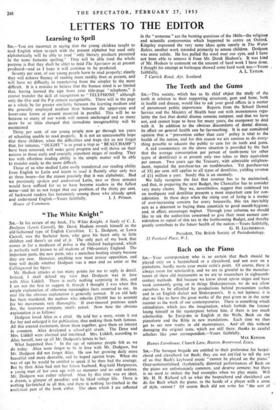LETTERS TO THE EDITOR
Learning to Spell.
Sut,—You are incorrect in saying that the young children taught to read English when re-spelt with the present alphabet but used only
alphabetically will be able to read " only literary products presented in the same fantastic spelling." They will be able (and the whole purpose is that they shall be able) to read The Spectator as at present produced—and as I hope it will continue to be produced.
Seventy per cent. of our young people learn to read properly; clearly they will achieve fluency of reading more readily than at present, and will have no difficulty in transferring from the simpler to the more difficult. It is a mistake to believe that the human mind is so limited that, having learned the sign from your title-page "telephone," it cannot transfer the skill of recognition to "TELEPHONE" although only the 0-o and the P-p remain recognisable. There will in the page as a whole be far greater similarity between the learning medium and the generally employed medium than 'between the upper-case and lower-case forms at present mastered in parallel. This will be so because so many of our words will remain unchanged and so many more be so little changed that immediate -recognisability will be maintained Thirty per cent. of our young people now go through ten years of schooling unable to read properly. It is not an unreasonable hope that these children, when the difficulties and traps (let us not forget that, for instance, " OUGHT " is as great a trap as " BEAUCHAMP ") have been removed, will make good progress and will- thrive on their success in those early and crucially important stages of reading. They too with effortless reading ability in the simple matter will be able to transfer easily to the more difficult.
Those of us who studied Latin easily transferred our reading ability from English to Latin and learnt to read it fluently after only two or three hours—for the reason precisely that it was alphabetic. Had we previously spoken and .understood Latin, two or three minutes would have sufficed for us to have become readers in the fullest sense—and let us not forget that our problem. of the thirty per cent. of backward readers lies fortunately among those who already speak
and understand English.—Yours faithfully, I. J. PITMAN. House of Commons.


































 Previous page
Previous page